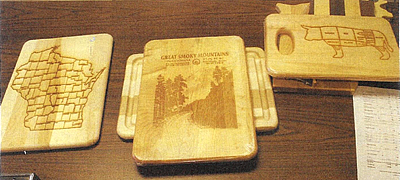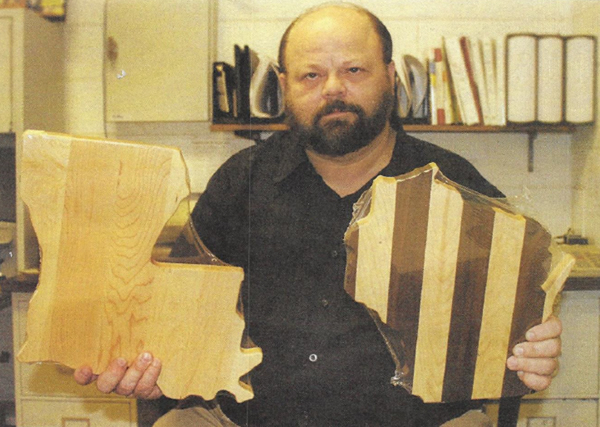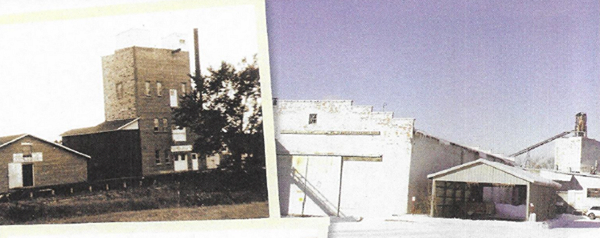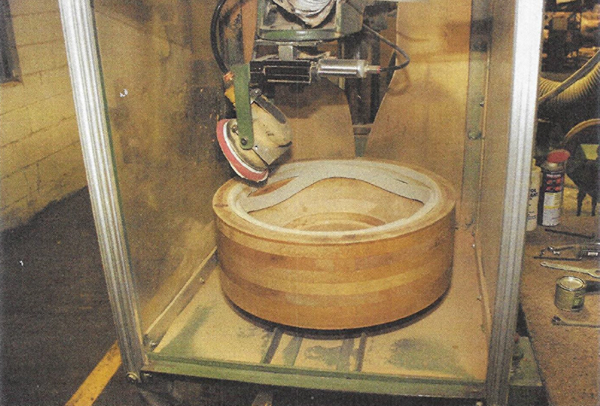Founding members of Snow River Cooperative
Snow River Cooperative Preserves Rural Jobs
Snow River Cooperative specializes in quality bowls and cutting boards made of repurposed wood, making each piece uniquely beautiful and environmentally friendly.
Rural Roots
Crandon is located 84 miles northeast of Green Bay, Wisconsin, and is the county seat of Forest County. There is not a single traffic light or parking meter in the whole county. Boasting a dense forest, the area has been heavily influenced by the boom and bust of the lumber and manufacturing industries. It is an area where retaining jobs is important. It is also home to one of Wisconsin's newest cooperatives: Snow River Cooperative.
A Longtime Employer
Snow River Cooperative is the latest iteration of a wood manufacturing company with a history that stretches back over one hundred years. Bemis Manufacturing was started in 1901 in Sheboygan Falls, WI. In 1965, Bemis established a woodworking plant in Crandon that specialized in making items such as bowling pins, parts for sleds, croquet balls, and baseball bats. In 2002, the plant was purchased by Columbian Home Products, which manufactured home goods and kitchenware.
Workers Take the Reins
When the owner of Columbia Home Products decided to exit the business, the employees of a profitable division of the company that focused on quality wooden bowls and cutting boards, turned to their union for support. The local union engaged the national union, which began exploring the possibility of the workers purchasing their division of the company and structuring it as a worker-owned cooperative.
The workers, many of whom have been with the company for over 30 years, decided to pursue the idea, knowing it was their best chance at saving their jobs. The University of Wisconsin Center for Cooperatives and Cooperative Development Services provided education on the cooperative business model, technical assistance with the business plan and legal documents, and referrals to lenders and attorneys. Shared Capital Cooperative and Local Enterprise Assistance Fund, lenders specializing in cooperatives, provided loans and a new line of credit. After six months of exploration and planning, Snow River Cooperative officially incorporated in April 2020, saving eight union jobs and retaining this successful manufacturing business in rural Wisconsin.
Snow River Products LLC, Transition from Whiskey to Cutting BoardsArticle and photos by Mike Monte
www.gltpa.org
February 2017
Plant Manager, Brian Sinclair, bsinclair@snowrivercoop.com, displays two of the state-shaped cutting boards, with Louisiana on his right, and
if you live in the Lake States, you should be able to recognize Wisconsin in his left hand.
Crandon, Wisconsin has a wood-working plant that turns hardwood into high-rate cutting boards. Snow River has been operating in Crandon since 2002 in a building on the north side of town that has an interesting past.
Back in 1932, prohibition had officially ended. Crandon, like many towns across the nation, didn't necessarily go dry. Making whiskey went from the big distilleries to backwoods occupations, and Crandon had a leg up on many other communities. Many of the early settlers were from northeast Kentucky, and making whiskey was as common as making coffee. They had been in the whiskey business for years in Kentucky, learned to make good stuff, and turned their talents to supplying the illegal whiskey market. Unlike many places, Crandon area whiskey, at least a sizable amount, could be called "top shelf." The whiskey technology had followed them to the Northwoods.
The old distillery building when it was a new distillery building, and the way it looks today.
This shot was probably taken in the thirties, when whiskey was the product. The man on the far left is Emil Zinser-plant manager, Everett Beam-the guy with the whiskey formula from the Jim Beam family, and Forrest Himes, a local logger, sawmill owner and lumber retailer.
With the end of prohibition, which didn't work very well, one of Crandon's big-time moonshiners and bootleggers, Black Gambill, started a distillery, a legal distillery. He made whiskey for Four Roses, and brought a good still man up from Kentucky named Everett Beam. Everett learned a lot from the family business, Jim Beam.
All went well until WWII, when the federal government ordered them to stop the whiskey business and start manufacturing alcohol for the war effort. After the war, the whiskey trade was resumed, but the four year wait to age the whiskey put financial pressure on the business and they closed in 1950.
There was no more whiskey, area cattle and pigs likely suffered alcohol withdrawal when their diet of whiskey mash was cut off, and a very nice brick building sat gathering dust. By 1955, a plywood manufacturing business was put in the building, but after a few years it faded, and the Bemis Corporation from Sheboygan took over the facility in 1965, and a number of wooden products were produced, including toilet seats and bowling pins. They sold out to Snow River, and they are still making sawdust.
Snow River specializes in wooden cutting boards. For years, they made the wooden cutting boards for Weber grills, but like a lot of products in this country, that manufacturing went to China. The Chinese do use North American maple, but the logs are sent to China. One of the reasons for this was the switch by Americans to gas grills from charcoal. In Europe, charcoal and the famous Weber "pot" grills are the way people cook out. So the majority of Weber grills, with American maple attachments, are sold in Europe.
Another product made at Snow River are the wooden bowls. This is a bowl turned from composite pieces that come out of the turning and sanding machinery looking very classy. Lately, they have made some custom I-pad stands, and are more than willing to do more.
Different markets were sought, and producing a large selection of wooden cutting boards was the route chosen. There is actually a very wide assortment of cutting boards made at Snow River. If you would like a board in the shape of Wisconsin, you can order that board from Snow River. Boards in the shape of Louisiana were manufactured in the plant, as well as some Texas shaped boards.
Snow River is also capable of making custom cutting boards for special events and occasions. Because of their ability to laser etch text and art on the boards, and to make custom boards in small quantities, it is an option for people or organizations to have a unique gift to present to guests or for small shops to handle with custom art and their name on the board. How many do you have to order?
Plant manager, Brian Sinclair bsinclair@snowrivercoop.com added that they don't just do maple cutting boards. They also do cherry and walnut combinations, and, he added, they might be pretty, but they are very practical and usable.
Sinclair said they are always open for orders to increase their business, and they are there to cater to the needs of the customer. If you have an idea for a wooden product, by all means contact Sinclair.
Another interesting note about Snow River is that they are making these attractive wooden products out of left-overs. What this means is that they are utilizing the pieces cut by other manufacturers for their product, and the ends of things like cabinet doors that would normally be thrown in a chipper or even a landfill, are brought to Snow River and turned into attractive, practical and worthwhile products. Sinclair calls it "re-purposing."
Plant manager Brian Sinclair is an old veteran at manufacturing products from wood. He is from the state of Maine, and he found his way to Wisconsin to run U.S. Stick, a company in Rhinelander, Wisconsin that made ice cream bar sticks, corn dog sticks, paint stirrers and more. From U.S. Stick, he made his way to Laona to work with Superior Flooring, and stayed there until W.D. Flooring bought them out. The next step was to Merrill, Wisconsin, where he worked in metal manufacturing. This didn't work for him. It seems that he caught the disease known well by many in the Lake States. He suffered from "Sawdust in the Blood." I have been told there is no cure for this, and Brian found that out when he took a job with the pet supply retailer, Foster & Smith. The logical step was to come to Crandon and run Snow River.







